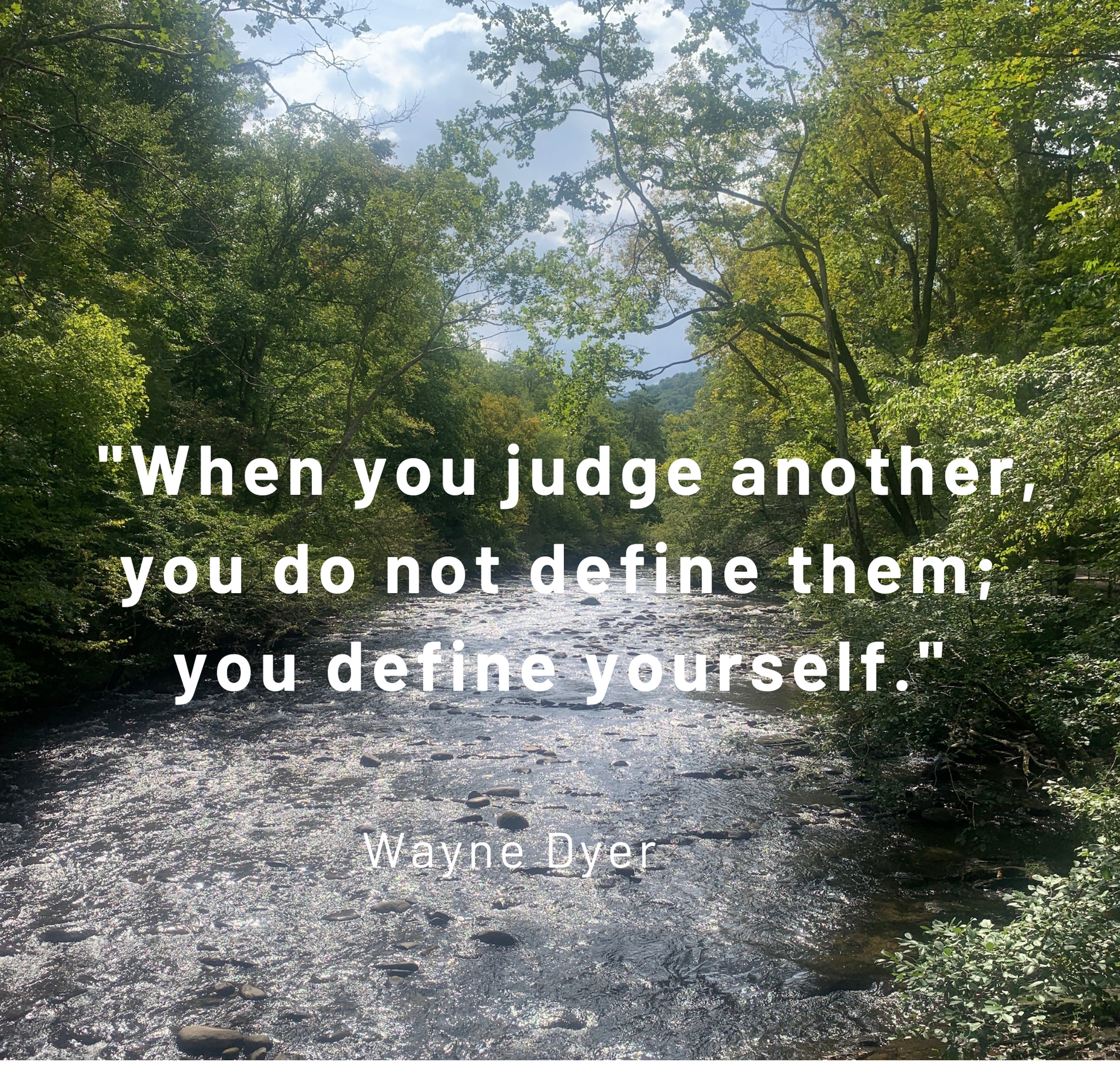
A few months ago, I read a book that completely transformed my perspective on judgment. It profoundly impacted how I think about and judge others. In this blog, I can't wait to share the powerful insights I gained and how they can help you break free from judgmental thinking.
It fascinates me about how much we are quick to judge others. Why is that?
When my children were all at home, I judged them a lot
without trying to find out their side of the story. I just assumed they were on the wrong side of the fence, being the cause of whatever mischief they were in that day.
Or judging my husband when he was late getting home from work and not telling me.
Judging others is a natural human tendency. We often assess and evaluate the behaviours, choices, and appearances of those around us, forming opinions that can be either positive or negative.
As parents, it's critical to understand the impact of judging others, especially our youngsters, and to learn how to foster a more accepting and supportive environment at home.
In this blog, I’m delving into what judging others entails,
How Judging Others Affects Our Mental and Physical Health, 7 Ways Not to Judge Others, How Not to Judge Your Youngsters, and How We Judge Others is How We Are Judged.
What is Judging Others?
Judging others involves forming opinions or conclusions about someone based on their actions, behaviours, appearance, or other characteristics. Judging can happen consciously or subconsciously and often stems from our beliefs, experiences, and biases. Judgments can be quick and based on little information or be more thoughtful and detailed.
Here is an example:

The other day, I was helping out at the school when I noticed a student who seemed withdrawn and wasn’t participating in group activities. I quickly thought the student was unfriendly and perhaps shy.
My judgment was based on observing this student's behaviour during a school event, influenced by my belief that children should always be social and outgoing.
Later, I discovered from the teacher that this student had recently moved to the area and was struggling with the transition. She is also dealing with the recent loss of a close family member, which has made her more reserved.
This example shows how quickly I formed an opinion without knowing all the circumstances. It is so easy to do.
While some judgments can be positive and constructive, such as recognizing someone's hard work or kindness,
negative judgments can lead to criticism, prejudice, and misunderstanding. In the context of parenting, this can significantly affect the parent-child relationship and your child's development.
How Judging Others Affects Our Mental and Physical Health
Negative judgments can have significant implications on both mental and physical health. Here’s how:
1.
Stress and Anxiety: Constantly judging others can lead to stress and anxiety.
When we spend time and energy worrying about what other people do and their decisions, we add unnecessary stress to our lives. This habit can make us more anxious because we become overly focused on others' behaviours instead of our well-being. It can also create a negative mindset where we always look for faults in others, which can be exhausting and mentally draining. Over time, this can take a toll on our mental health and eventually physical health, making it harder to relax and enjoy life.
A study published in the Psychological Science journal found that people who engage in frequent negative judgments are more likely to experience higher stress levels and poor health outcomes (Sutin et al., 2013). Conversely, practicing acceptance and reducing judgment can improve overall well-being.
2.
Decreased Self-Esteem: Harsh judgments often stem from our insecurities.
Focusing on others' perceived flaws can compound our feelings of inadequacy and lower self-esteem. Here is what I mean: Judging other parents at your child's school for their parenting choices, such as what they pack for lunch or how they handle their children's behaviour. These harsh judgments are rooted in insecurities about us not being good parents. By fixating on flaws in other parents, we try to cope with our feelings of inadequacy to bolster our self-esteem.
3.
Relationship Strain:
Judging others can lead to conflicts and strained relationships.
Strained relationships are particularly true in parent-child relationships, where judgment can hinder open communication and trust.
For example, I know of a parent who often judges their son's choice of friends and social activities. This parent frequently tells their son that their friends are a terrible influence and criticizes their son for spending time on what they deem frivolous activities. The son feels judged and alienated by his parent’s comments, leading him to hide aspects of his social life from him. The constant judgment erodes trust, making the son less likely to seek his father's advice or confide in him about his experiences and challenges. This lack of trust creates a barrier to open communication and weakens their relationship.

7 Ways Not to Judge Others
Avoiding judgment requires conscious effort and practice. Here are some practical strategies:
1.
Have More Self-Awareness:
Self-awareness is foundational in changing ourselves. Understanding our thoughts and behaviours can cultivate a deeper awareness of how we judge others.
This self-awareness allows us to interrupt negative patterns of judgment, paving the way for personal growth and improved relationships with our children.
2.
Cultivate Compassion:
Actively cultivate compassion for yourself and others.
Recognize that everyone has their struggles and that kindness goes a long way in fostering understanding.
3.
Practice Gratitude: Focusing on the positive aspects of your life can shift your mindset away from judgment. As I discussed in a previous blog, you can write what you are grateful for in a gratitude journal or, throughout the day,
take a one-minute mental break to think about your blessings.
4.
Challenge Negative Thoughts:
When judging someone, challenge your thoughts.
Ask yourself if you have all the information or if your judgment is fair and kind. I do this regularly by asking myself:
- Do I have all the facts about this situation?
- How would I want to be treated in a similar situation?
- Am I projecting my insecurities or issues onto this person?
- How can I handle this situation with empathy and understanding?
5.
Engage in Perspective-Taking: As the saying goes, "Before you judge a man, walk a mile in his shoes."
Consider the other person’s background, experiences, and challenges before forming an opinion.
6.
Educate Yourself:
Learn about different cultures, lifestyles, and perspectives.
Understanding diversity can reduce prejudices and foster a more accepting attitude. I love this one. Learning about other cultures and why they do things the way they do helps to remove judgment and bias.
7.
Practice Active Listening: Engage in active listening when interacting with others, especially your youngsters.
Focus not only on the words they say but also on their emotions and underlying messages. By genuinely listening, you can gain a deeper understanding of their perspectives and avoid jumping to conclusions or making quick judgments.

5 Ways Not to Judge Your Children
As parents, we must behave non-judgmentally to create an environment for our children filled with love and support. I know firsthand how easy it is to judge others and situations quickly. When I became a parent, I fell into this habit too quickly. It was a learned behaviour ingrained over time. However, I'm committed to breaking this cycle.
1. Practice Empathy:
Try to understand things from your child's perspective.
Empathy allows you to connect with their feelings and experiences, reducing the likelihood of harsh judgments.
2. Avoid Comparisons: Comparing your child to others can cause them to feel inadequate and resentful. Recognize and appreciate your child's unique qualities and achievements.
3.
Focus on Behavior, Not Character:
When addressing issues,
focus on specific behaviours rather than labelling your child. For example, say, "Leaving your toys everywhere makes the house messy," instead of "You're so messy."
4.
Encourage Open Communication:
Create an environment
where your child feels safe to express themselves without fearing judgment. Listen actively and validate their feelings.
5.
Model Non-Judgmental Behaviour:
Children learn by observing everyone around them, especially parents and grandparents.
Demonstrate acceptance and understanding in your interactions with others.

How We Judge Others is How We Are Judged
The principle of reciprocity shapes human behaviour. How we judge others influences how others judge us. Various religious and philosophical teachings echo this concept. For example, the Bible states, "Do not judge, or you too will be judged" (Matthew 7:1, NIV). Similarly, Buddhism teaches that karma means our actions, including judgments, have consequences.
When we judge others harshly, we create a negative atmosphere that can lead to similar treatment. Conversely, approaching others with kindness and understanding fosters a more positive and supportive environment. The principle of reciprocity is particularly relevant in parenting, where the relationship dynamics are crucial for your child's development.
Conclusion
Judging others, especially our children, can profoundly affect our relationships and overall well-being. By practicing empathy, avoiding comparisons, and focusing on behaviours rather than character, you can create a more supportive and nurturing environment for your youngsters. Recognizing the impact of your judgments on your mental and physical health further underscores the importance of cultivating a non-judgmental attitude. You can reduce negative judgments and foster a more positive and understanding world through self-awareness, compassion, gratitude, and perspective-taking.
Remember, how we judge others is how we will be judged. By setting a positive example, you improve your well-being and create a more accepting and supportive community for your children to thrive in.
As the renowned author and motivational speaker Wayne Dyer once said, "When you judge another, you do not define them; you define yourself."

Next Week's Blog
Next week, I'm diving deeper into the crucial topic of setting boundaries. Let's face it: setting boundaries isn’t easy; it takes courage to stand up and assert your needs. I experienced this firsthand just this past week.
In a business situation, I reached a breaking point. I had been promised a result by a specific deadline. Still, as time passed, I made excuses for the other person—rationalizing their behaviour by thinking they might be sick or that everything happens for a reason. Despite these justifications, a nagging feeling told me something was wrong. They missed the deadline by two weeks without any communication, and what truly bothered me was the lack of consequences for their inaction.
So, I decided to set a boundary.
I will explore the importance of setting boundaries with children, partners, and ex-partners. We'll discuss practical strategies for asserting your needs and maintaining healthy relationships in every aspect of life.
Remember, change begins with ourselves.
Put your knowledge into action and reach your full potential !
Wishing you heartfelt warmth and
support on your parenting journey!
Cathy
Wish Setting Boundaries Was Easier?
Grab your FREE 7-day guide and create boundaries that bring you peace and balance!
